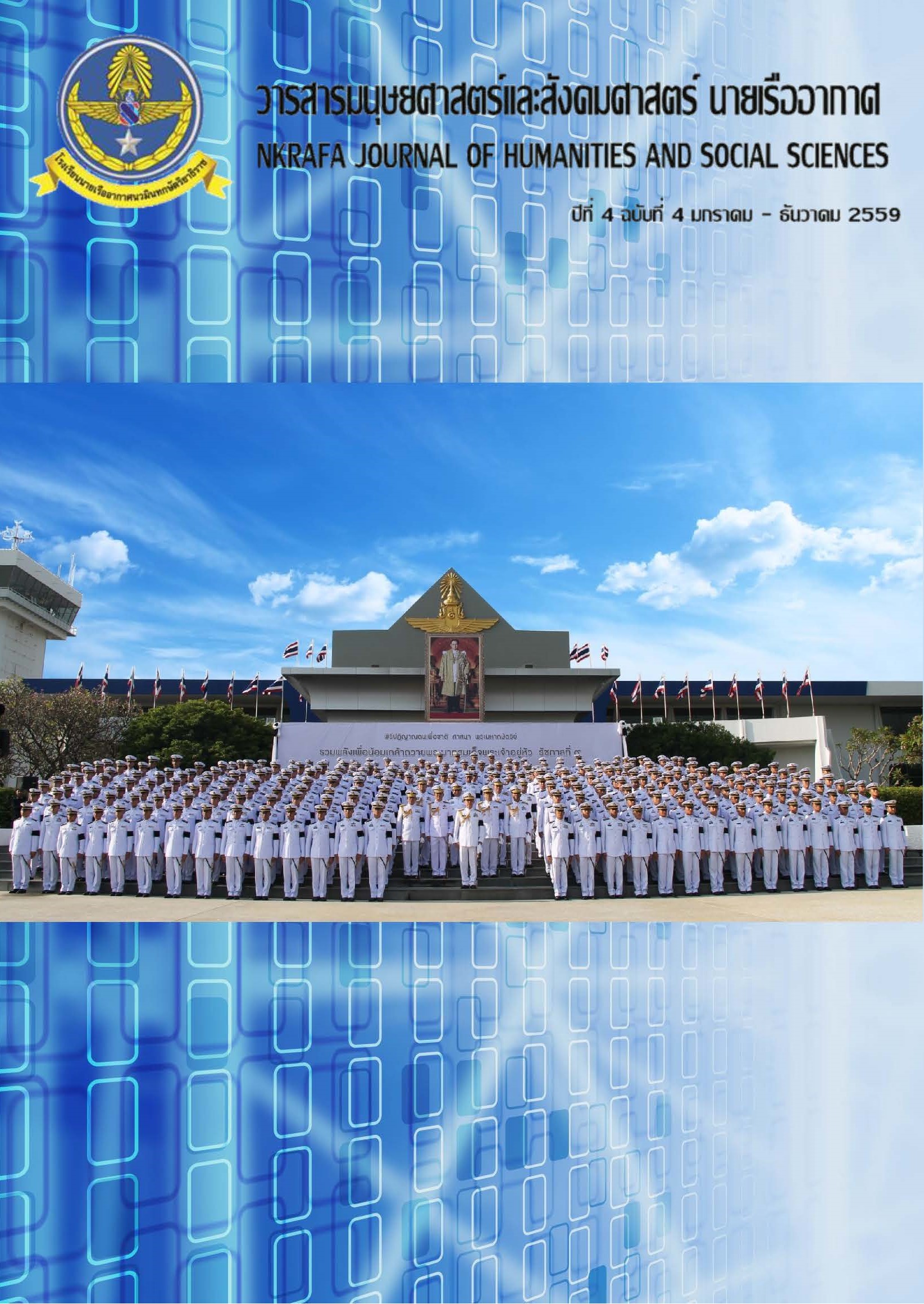Leadership Traits among new officers who graduated from NKRAFA: A case study of Academic year 2014
Main Article Content
Abstract
One of the main purposes of this research is to evaluate the military leadership attributes according to the Royal Thai Air Forces (RTAF) core values. For this, there is an all-round evaluation of new officers who recently graduated from Navanida Kasatriyadhiraj Royal Air Force Academy (NKRAFA). The other pur-pose is to study factors that affect the evaluation of the military leadership attributes mixed-method re-search, as the evaluators come from a variety of military ranks. Quantitative data was collected from questionnaires that questioned 5 commanders, 36 new of-ficers and 153 air force cadets (who are studying in their second to forth year as of the 2014 academic year). Data was collected and analysed by a statistical computer programme. Analytical statistics are per-centage, mean, standard deviation, t-test, f-test, and P-value at 0.05 level of statistical significance. Fur-thermore, quantitative data was collected by in-depth interview with commanders. The research found that the evaluation from subordinates, commanders and new officers of the military leadership’s attributes according to the RTAF’s core values was at a high level. The year that a cadet was studying in as a factor that affected the evaluation of the military leadership’s responsibility. This is due to the points given by those studying in their second year being significantly different to those studying in other years. The research suggests that the second to forth year cadets should be mixed in each battalion. This way will be reduced the seniority which is a barrier of the battalion. Without this, it is worth to belief that cadets’ potentials shall be developed and pushed their leadership’s attributes outstandingly.
Article Details
บทความที่ได้รับการตีพิมพ์เป็นลิขสิทธิ์ของวารสารมนุษยศาสตร์และสังคมศาสตร์ นายเรืออากาศ
ข้อความที่ปรากฎในบทความแต่ละเรื่องในวารสารวิชาการเล่มนี้ เป็นความคิดเห็นส่วนตัวของผู้เขียนแต่ละท่าน ไม่เกี่ยวข้องกับโรงเรียนนายเรืออากาศฯ และคณาจารย์ท่านอื่น ๆในโรงเรียนนายเรืออากาศฯ แต่อย่างใด ความรับผิดชอบขององค์ประกอบทั้งหมดของบทความแต่ละเรื่องเป็นของผู้เขียนแต่ละท่าน หากมีความผิดพลาดใด ๆ ผู้เขียนแต่ละท่านจะรับผิดชอบบทความของตนเองแต่เพียงผู้เดียว
References
http://www.person.rtaf.mi.th/BY2556/DevDivision/RTAF%20Core%20Values_56.pdf
กองพัฒนาภาวะผู้นำ. (2556). ภารกิจกองพัฒนาภาวะผู้นำ. สืบค้นจาก http://cadetwing.nkrafa.ac.th/?p=926
จตุพล ยงศร และคณะ. (2543). การพัฒนาตัวบ่งชี้การประกันคุณภาพการศึกษาภายในโรงเรียนนายเรืออากาศ.
วารสารอิเล็กทรอนิกส์ มหาวิทยาลัยกรุงเทพ. สืบค้นจาก
http://www.bu.ac.th/knowledgecenter/epaper/jan_june2010/pdf/Page_98.pdf
ชาตรี ศรีด้วง.(2557). นายทหารแผนและโครงการ กพภ.ฯ. สัมภาษณ์ 16 ธันวาคม 2557.
ธนากร เอี่ยมปาน. (2559). ปัจจัยที่ส่งผลต่อภาวะผู้นำการเปลี่ยนแปลงของนักบินกองทัพอากาศ. วารสารวิชาการ
มหาวิทยาลัยอีสเทิร์นเอเชีย ฉบับสังคมศาสตร์และมนุษยศาสตร์, 6(1). สืบค้นจาก https://www.tci-thaijo.org/index.php/EAUHJSocSci/article/download/56936/47319
ผู้บังคับบัญชา ก (นามสมมติ). (2558). ผู้บังคับบัญชา กองพัฒนาภาวะผู้นำ. สัมภาษณ์ 18 พฤษภาคม 2558.
ภัคณณ สินทสม และณัฐพล จารัตน์. (2558). คุณลักษณะผู้นำทางทหารที่พึงประสงค์ของกองทัพไทย. วารสารนัก บริหาร มหาวิทยาลัยกรุงเทพ, 35(1). สืบค้นจาก
http://www.bu.ac.th/knowledgecenter/executive_journal/jan_june_15/pdf/aw08.pdf
โรงเรียนนายเรืออากาศ. (2555). รายงานการประเมินตนเองประจำปีการศึกษา 2555. สืบค้าจาก http://www.rtafa.
ac.th/index.php?option=com_docman&task=doc_download&gid=310&Itemid=101
โรงเรียนนายเรืออากาศนวมินทกษัตริยาธิราช. (2559). นโยบายผู้บัญชาการ โรงเรียนนายเรืออากาศนวมินทกษัตริยาธิ
ราช พ.ศ.2559. สืบค้นจาก http://nkrafa.ac.th/images/document/nkrafa_policy.pdf
Edward T. (1976). Hall’s Cultural Iceberg Model. Retrieved from
https://equity.spps.org/uploads/iceberg_model_3.pdf


